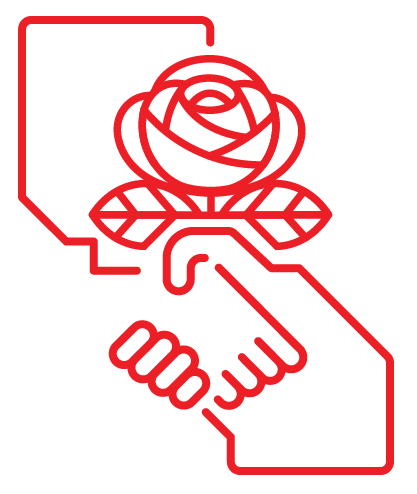Maturing DSA: A personal view of the convention
The 2023 DSA national convention ends with a thousand socialists singing “Solidarity Forever”. PHOTO CREDIT: Zach Weinstein
In 2021, I attended my first DSA convention on Zoom. Spread out over most of a week and dozens of hours of screen time, it was marked by allegations of interpersonal misconduct against NPC candidates, a barely contested NPC election, a crash-prone voting system, and a parade of procedural motions (despite the overall unpopularity of nearly all such motions). I’d been a DSA member for less than a year at the time I was elected to be a delegate, and already felt like I needed a break.
Fast forward to 2023, my first in-person convention in Chicago. While COVID remains a persistent and serious public health concern (which convention organizers took measures to mitigate), the benefits of an in-person convention were immediately apparent on arrival. I returned to the East Bay after the convention last month energized to both bring back lessons I had learned to my chapter, and to work with comrades in other chapters on national projects like the National Labor Commission.
An overall convivial atmosphere
The chance to see comrades in person, speak to people from different political tendencies face-to-face, and feel the energy of 1000 plus socialists in a room with you (who, over the objections of the chair, will let you know if you’ve lost their favor due to uncomradely debate or wasting their time with procedural wrangling), encouraged an overall convivial atmosphere.
It can be easy to forget that a person whose debate point you disagree with or whose NPC candidacy you oppose is a comrade when they’re a face in a tiny box on Zoom or a block of text in a slack channel. That’s less likely when they’re greeting you with a smile and literature at breakfast, or are helping fundraise nearly $5,000 for striking UE workers at a party held in the historic Chicago UE hall. Throughout the weekend, I connected with dozens of comrades through both official breakouts and informal conversations about our shared project of launching local EWOCs in our chapters, something that would have been impossible over Zoom. It was also much easier for the convention chairs to quickly call for and visually gauge the results of uncontroversial votes.
Not all of these positives can be wholly attributed to the return to an in-person convention. Those of us who have stayed engaged and active in DSA, outside the boom times of 2017-2021, have matured politically. DSA is a young political organization, in that the vast majority of those of us who joined in those growth years are still under forty. Another two years of political experience for a DSA member like me represented more than a fifty per cent increase in my time as an organized socialist, as it was for hundreds of others at convention.
Clearly committed
Those who have continued fighting the good fight in labor, tenant organizing, and class struggle elections —soldiering on in DSA through the 2020 presidential primary, the isolation and mass death of COVID-19, and the nationwide bipartisan backlash against the George Floyd uprising—are clearly committed. New members since 2021 likely aren’t joining because they think there’s going to be another Bernie moment in 2024, which could contribute to an openness to new strategies besides the high-profile national election campaigns that have historically fueled DSA’s growth.
In short, while DSA’s membership has declined, those of us who are sticking around have clearly grown up since 2021.
A less mature organization may have seen every organized faction trying to make political hay out of our decline in membership, but convention instead began with a sober, action-oriented presentation from NPC treasurer Ashik S on how a deliberate push for income-based dues could sustain DSA, setting a tone that all delegates and members are collectively responsible for the financial well-being of our political home.
Procedural motions were kept to a minimum and voted on swiftly, with only one well-organized cross-caucus effort to change the agenda by adding some substantive items (like one put forward by the BDS Working Group). Such moves come at the expense of moving less controversial items to the consent agenda (such as adopting Bud as our mascot). Rather than questioning the character or motivations of those they disagreed with, debate on the floor from delegates was almost universally substantive.
I left Chicago with a feeling that DSA is rising to meet this new political moment, and a sense of shared responsibility with the thousand plus comrades in attendance and the eighty thousand plus members across the country for building a strong, vibrant socialist movement in the US.

